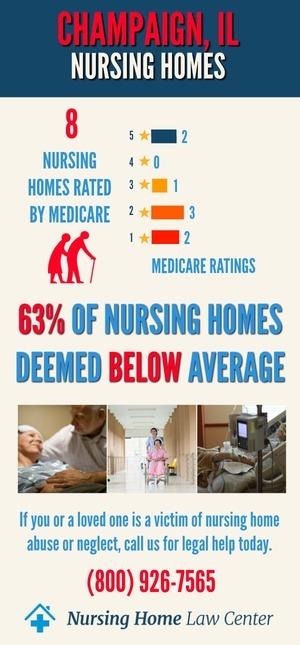The Nursing Home Law Center is committed to providing the legal resources necessary to hold negligent facilities accountable.
Champaign Nursing Home Abuse Lawyer

Licensed in Illinois
Nursing home abuse is a serious issue affecting many elderly residents across Champaign, Illinois. The decision to place a loved one in a nursing home is never easy, and it’s heartbreaking when nursing homes fail in their duty of care.
If you suspect abuse, it’s essential to take action immediately to protect your loved one’s rights and safety. Our experienced Champaign nursing home abuse lawyers are committed to seeking justice for victims and their families.
Why Hire Nursing Home Law Center
At Nursing Home Law Center, we are dedicated to ensuring justice and fair compensation for nursing home abuse victims. Our skilled legal team has a strong history of handling these sensitive cases and securing substantial settlements and verdicts for our clients.
We carry out comprehensive investigations to cover every aspect of the abuse, including medical costs, emotional distress, and other related damages. With our extensive knowledge of nursing home abuse claims, we handle the legal challenges efficiently, working relentlessly to safeguard your rights.
Throughout the process, we offer compassionate guidance and clear communication, ensuring that you and your family feel supported, informed, and secure.
Types of Cases Handled by Our Champaign Nursing Home Abuse Lawyers

Nursing home abuse refers to any intentional or negligent act that causes harm to an elderly resident. Abuse in Champaign nursing homes takes many forms, and our nursing home abuse attorneys are equipped to handle the following types of cases:
Physical Abuse
Physical assault in an assisted living facility involves the use of force that causes physical injuries or pain to elderly residents. This bodily harm can include hitting, slapping, or misusing restraints.
Mental and Emotional Abuse
Emotional abuse occurs when staff members use verbal threats, intimidation, or isolation to cause emotional distress.
Sexual Abuse
Sexual abuse includes any non-consensual sexual contact with elderly victims in nursing homes and assisted living facilities.
Medical Malpractice
Medical errors like bedsores, medication mistakes, and untreated infections are forms of negligence that can lead to severe harm.
Negligence
Nursing home negligence often involves poor hygiene, malnutrition, dehydration, and elopement (when a resident leaves the facility unsupervised).
Financial Abuse
Financial exploitation, such as unauthorized withdrawals or mismanagement of an elderly resident’s finances, is a form of abuse that can cause long-term harm.
Wrongful Death
In the most tragic cases, neglect or abuse can lead to the wrongful death of a loved one. Our Champaign nursing home abuse lawyers are here to help families seek justice.
Understanding Your Legal Rights
Federal and state laws protect nursing home residents’ rights to safety and quality care.
The Nursing Home Reform Act of 1987 establishes certain protections for residents, including the right to be free from abuse, neglect, and exploitation.
Illinois law also outlines strict regulations for nursing homes to follow.
Elder abuse victims can seek legal action against negligent nursing homes. Family members, legal guardians, or representatives can also file claims on their behalf.
Liability in Nursing Home Neglect and Abuse Cases
In nursing home abuse cases, liability may extend to multiple responsible parties. These can include:
- Nursing home facility
- Nursing home staff
- Facility management and administration
- Medical providers
- Third-party contractors
Each party plays a vital role in the well-being of nursing home residents, and identifying those responsible is essential for seeking justice.
How Our Champaign Nursing Home Abuse Attorneys Can Help
Our Champaign attorneys have extensive experience in handling nursing home abuse cases. We are dedicated to helping families recover compensation and seek justice for their loved ones. Our services include:
- Free Case Evaluation: We offer a free consultation to assess your case and advise you on the next steps.
- Case Investigation: We thoroughly investigate abuse allegations in nursing facilities, gathering evidence to build a strong case.
- Filing the Claim: Our attorneys handle all aspects of filing a claim, ensuring the process is smooth and timely.
- Settlement Negotiation: Many nursing home abuse cases are settled before trial. Our team works diligently to secure fair compensation for victims.
- Trial Representation: If a settlement cannot be reached, we will take your case to trial and fight for justice in court.
Common Signs of Elder Abuse Among Nursing Home Residents
Of Champaign’s 10 Medicare-approved nursing homes, 90% of facilities are struggling with their overall ratings. Specifically, 70% of nursing homes fall short in health inspections, and 80% have inadequate staffing. 50% of nursing homes rated poorly in quality measures. [1]
The worst-rated nursing homes in Champaign include:
| Accolade Healthcare of Savoy | Farmer City Rehab & Healthcare |
| Goldwater Care Gibson City | Illini Heritage Rehab & Hc |
| Piatt County Nursing Home | Tuscola Health Care Center |
Elder abuse in assisted living facilities can take many forms, and it is important to be aware of the warning signs to protect your loved ones.
- Unexplained bruises or injuries
- Sudden weight loss
- Poor hygiene or bedsores
- Depression or withdrawal
- Fearfulness around staff
- Missing personal belongings
What to Do If You Suspect Nursing Home Abuse
If you suspect that a loved one is being abused or neglected in a nursing home, it’s essential to act quickly to ensure their safety and well-being by following these steps:
- Call 911 if your loved one is in immediate danger.
- Report the abuse to the nursing home administrator or management.
- File a complaint with your local Ombudsman’s office. The Ombudsman acts as an advocate for nursing home residents and investigates complaints.
- Contact a nursing home abuse lawyer to discuss your legal options and ensure your loved one’s safety.
Damages You Can Recover Through a Nursing Home Abuse Claim
If your loved one has been a victim of nursing home neglect or abuse, you may be entitled to recover various types of damages to compensate for the harm caused.
Economic Damages
These damages are meant to compensate for the actual financial losses related to the abuse or neglect. Examples include:
- Medical expenses
- Relocation costs
- Financial losses
Non-Economic Damages
These damages compensate for the emotional and physical suffering caused by the abuse. Examples include:
- Pain and suffering
- Emotional distress
- Loss of companionship
Punitive Damages
These damages are awarded in cases where the abuse was particularly egregious or intentional. Punitive damages are meant to punish the responsible parties and deter similar behavior in the future.
The Cost of Hiring a Champaign Nursing Home Abuse Attorney
At Nursing Home Law Center, we believe every family deserves access to justice. That’s why we offer our legal services on a contingency fee basis, meaning you won’t pay anything unless we recover compensation for your case.
You Have Limited Time to Take Legal Action in Champaign
In Illinois, the typical statute of limitations for nursing home abuse or neglect claims is two years from the date the abuse occurred or from the time you discovered the abuse.
Failing to file within this window can result in your case being dismissed, leaving you unable to pursue compensation for your loved one’s suffering.
Contact a Champaign Nursing Home Abuse Attorney Today!
At Nursing Home Law Center, our Illinois nursing home attorneys have extensive experience representing victims of nursing home abuse in Champaign and throughout Illinois. We understand the pain and frustration families feel when their loved ones are mistreated, and we are committed to holding negligent nursing homes accountable.
With a proven track record of securing significant settlements and verdicts, our team is ready to fight for the justice and compensation your family deserves. Contact us today for a free consultation and take the first step toward justice for your family.
Call us at (800) 926-7565 or fill out our contact form.
References: [1] Medicare

